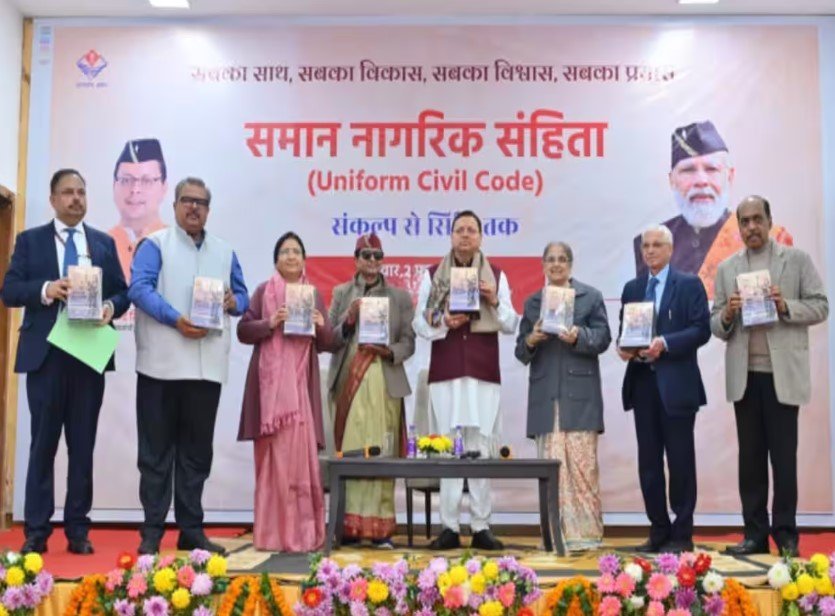Background of the Uniform Civil Code in India:
The Uniform Civil Code (UCC) has been a longstanding and contentious topic in the Indian legal and social discourse. Rooted in the Directive Principles of State Policy outlined in the Constitution, the UCC aims to provide a single, secular set of laws applicable to all citizens, regardless of their religious affiliations. This article explores the background of the UCC, its association with Hindu and Muslim communities, and the potential impact on Indian society. Additionally, we will examine countries where a uniform civil code has been implemented, both successfully and with challenges.
The idea of a Uniform Civil Code traces its origins to the framers of the Indian Constitution who envisioned a legal framework promoting equality and justice for all citizens. Article 44 of the Directive Principles of State Policy specifically recommends that the State shall endeavour to secure for its citizens a Uniform Civil Code throughout the territory of India.
However, the implementation of the UCC in India has been a complex journey, primarily due to the diverse religious and cultural landscape. The country recognizes different personal laws for various religious communities, with Hindus, Muslims, Christians, Sikhs, and others governed by separate sets of laws pertaining to marriage, divorce, inheritance, and other personal matters.
Debatable Context
The UCC debate in India often revolves around its association with the Hindu and Muslim communities, two of the largest religious groups in the country.
Hindu Personal Laws: The Hindu community in India is primarily governed by a set of personal laws, including the Hindu Marriage Act, Hindu Succession Act, and Hindu Adoption and Maintenance Act. These laws underwent reforms over the years, aiming to modernize and bring gender equality to family matters.
Muslim Personal Laws: Muslims in India follow their own set of personal laws derived from Islamic jurisprudence. These laws cover aspects such as marriage, divorce, and inheritance. The debate around the UCC has been particularly sensitive within the Muslim community, with concerns about potential interference with religious practices and traditions.
Impact on Society:
Equality and Justice: Proponents of the UCC argue that its implementation would ensure equal rights for all citizens, irrespective of their religious background. It aims to eliminate gender-based discrimination and promote gender equality in personal matters.
Socio-economic Development: Advocates believe that a uniform legal framework would contribute to the socio-economic development of the nation. A standardized code could simplify legal procedures, reduce litigation, and foster a more conducive environment for economic growth.
Preservation of Cultural Identity: Opponents express concerns about the potential erosion of cultural and religious diversity. They argue that personal laws are integral to the cultural identity of communities and that imposing a UCC might undermine these distinct identities.
Religious Freedom: Critics contend that the UCC could be perceived as a violation of the right to freedom of religion guaranteed under the Indian Constitution. There are fears that a uniform code might override religious personal laws and encroach upon the religious practices of different communities.
Countries who Implemented Uniform Civil Codes and their Experience:
Several countries like france, Turkey ,USA etc around the world have implemented a Uniform Civil Code, each with its unique experiences, successes, and challenges.
France: France adopted a Civil Code, known as the Napoleonic Code, in 1804, which serves as the basis for its modern legal system. The code provided a unified set of laws, including those related to marriage, property, and contracts. While it has been successful in providing a standardized legal framework, debates continue on its adaptability to societal changes.
Turkey: After the establishment of the Republic of Turkey in 1923, significant legal reforms were introduced under Mustafa Kemal Atatürk. The Turkish Civil Code of 1926 aimed at modernizing the legal system and ensuring gender equality. While Turkey’s experience with a Uniform Civil Code has been relatively successful, debates persist on its compatibility with Islamic values.
Challenges and Failures:
Iraq: Iraq attempted to implement a Uniform Civil Code in 1959, drawing inspiration from Western legal systems. However, due to strong opposition from religious authorities and segments of society, the effort was abandoned, emphasizing the challenges posed by deeply ingrained cultural and religious values.
Indonesia: Indonesia, despite having a diverse religious landscape, introduced a Uniform Marriage Law in 1974. While the law aimed to provide a unified legal framework for marriage, the implementation faced challenges, particularly in regions where Islamic law holds significant sway. Local autonomy and cultural differences hindered the complete success of the Uniform Marriage Law.
Why is it hot news today?
Uttarakhand is set to become first state to implement Uniform civil code in india post independence. In an Event at CM Camp office Mr Dhami on Friday , CM of Uttarakhand said “ On February 12 ,2022 ,We made a promise to People of Uttarakhand to implement UCC and based on this ,respected people of uttarakhand elected us.Other states should also implement UCC in their states”.Let’s look panel and its draft submissions
Draft Committee of UCC
On 27th may 2022, the state government constituted the panel headed by justice Ranjana Prakash Desai along with justice Permod Kohli(Retd),social activist Manu Gaur, former chief secretary Shatrughan singh and VC of Doon university Surekha Dangwal to prepare UCC draft. Panel also did public interactions and took suggestions from public.A total of 43 public interactions were held and suggestions from 2.3 Lakh people were received before finalizing this draft. Though Draft has not been made public yet, however it is learnt from various sources that Panel may recommend below suggestions:-
- There might be common marriageable age for girls across all religions and procedures for divorce in all religions
- Tribal population could be exempted from this purview.
- There might be regulation in birth control ,live in relationships and limitations of no of children.
- It may take reference of Goa UCC which is operational since the Portuguese rule.
- The UCC will give a legitimate structure to uniform marriage, separation, land, and property for all residents regardless of their religion in the state.

A four-day session of the assembly has been covened from February 5-8 to pass legistation on the UCC . One step ahead,to spread awareness, Mr. Dhami also released a music video on the Uniform Common Code Bill named “Aa Raha Hai UCC” . The title melody has been composed and sung by Bhupendra Baseda and its tune is formed by Rakesh Bhatt. Mr. Dhami said that the UCC draft will be analyzed and discussed, before it is presented in the assembly.
Once UCC becomes the law of the land, it may spark several controversies and heated debates.The debate surrounding the Uniform Civil Code in India is a multifaceted one, intricately woven into the fabric of the nation’s socio-cultural diversity. While the aspiration for a unified legal framework is rooted in the principles of equality and justice, the complexities arising from religious diversity, cultural sensitivity, and constitutional considerations have impeded its smooth implementation.
Understanding the experiences of countries with implemented uniform civil codes provides valuable insights into both successes and challenges. Striking a balance between fostering equality and respecting cultural and religious identities remains a formidable task. As the dialogue on the UCC in India continues, it is essential to navigate this terrain with sensitivity, inclusivity, and a deep understanding of the diverse perspectives that shape the country’s social and legal landscape
























Comments 1